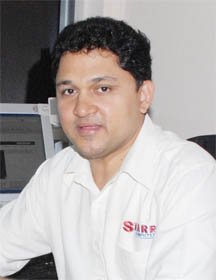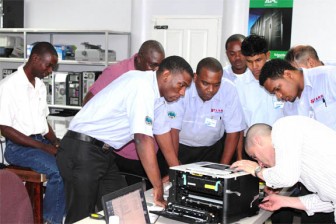Changing consumer purchasing patterns in the information technology sector in recent years is likely to continue to manifest in seasonal gift choices this year, Starr Computers General Manager Rehman Majeed told Stabroek Business in an interview earlier this week.
With seasonal purchases already in evidence at several IT service and equipment providers, Majeed said that both at Starr Computers and at other service providers in the industry the shift away from IT games had been “pretty significant in recent years”. Over the past three years, particularly, consumer choices had shifted radically from computer games to equipment that provides internet access.
“I think we can safely say that as far the Guyana market is concerned, the demand for games like the X Box, the MP3 Player and the Play Station, which was certainly high up to a few years ago is no longer…,” Majeed said. “We have seen a sustained swing towards preferences that have to do with access to the internet. These days the preferences have swung towards smart phones and lap tops. Samsung and Lenova have been the particularly popular brands. I expect that the trend would continue this year.”

According to Majeed, the shift in preference among IT buffs had occurred largely on account of “a significantly increased demand for information”. He said consumer preference for internet-related technology had impacted most heavily on the business community, social networking enthusiasts and students undertaking research.
“The shift has been driven by enhanced internet access. Everyone wants to acquire equipment that provides access to the internet,” Majeed added.
Meanwhile, Majeed told Stabroek Business that his company’s research had suggested that while consumer tastes in IT equipment had changed over the years the demand for the desktop computer had remained relatively stable. “Apart from the fact that a desk top computer appears to have become a virtual necessity in most households in Guyana there is also the issue of cost. Starr, for example, is offering a computer, monitor and printer for around $79,000. Everyone in the industry knows that today’s computer prices have more than halved when compared to ten years ago.”
And according to Majeed, growing consumer knowledge of the IT sector, particularly IT equipment continued to compel service providers to raise the quality of their service. “Part of the issue has to do with the fact that high-end IT equipment tends to be quite costly and people no longer walk into a store and simply buy a costly piece of equipment and leave with it. These days the provider must answer detailed questions about warranties and service contracts. Frankly, I believe that it is to the advantage of local suppliers to have service contract arrangements with manufacturers since, these days, the ability to provide reliable servicing could determine by as much as 40 per cent whether or not a supplier secures a sale. “We at Starr Computers would certainly feel less confident about our capacity to satisfy customer needs if we were not investing heavily in training,” Majeed added.

He said the competition in the local IT sector was such that none of the major service providers could boast of being permanently ahead of the game. “It’s really an ebb and flow situation. The fact that products and services come and go on the IT market so frequently, means that companies have to be on top of their game. The major players spend a lot of time monitoring what is happening at the production end of the process. You simply must know what’s new on the market and what is likely to fade out if you are to engage in strategic buying. In this business no one wants to be left with stock on hand that nobody wants to buy,” Majeed said.




